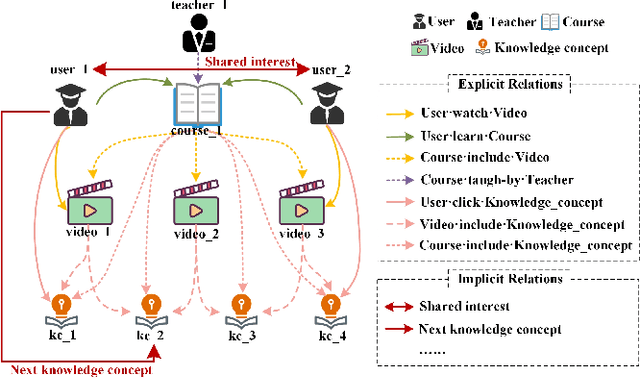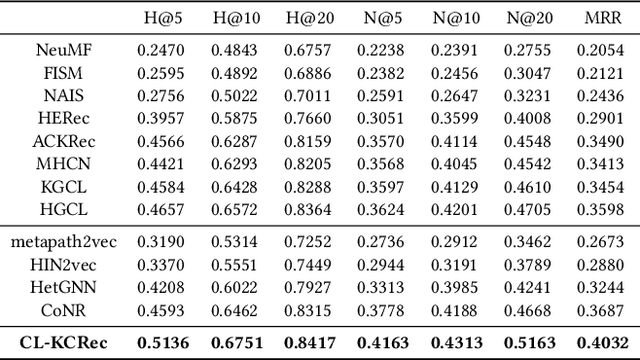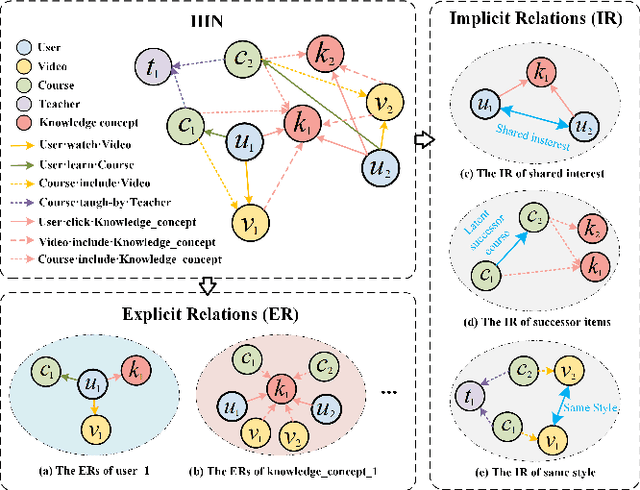Hengnian Gu
Cognitive Structure Generation: From Educational Priors to Policy Optimization
Aug 18, 2025Abstract:Cognitive structure is a student's subjective organization of an objective knowledge system, reflected in the psychological construction of concepts and their relations. However, cognitive structure assessment remains a long-standing challenge in student modeling and psychometrics, persisting as a foundational yet largely unassessable concept in educational practice. This paper introduces a novel framework, Cognitive Structure Generation (CSG), in which we first pretrain a Cognitive Structure Diffusion Probabilistic Model (CSDPM) to generate students' cognitive structures from educational priors, and then further optimize its generative process as a policy with hierarchical reward signals via reinforcement learning to align with genuine cognitive development levels during students' learning processes. Experimental results on four popular real-world education datasets show that cognitive structures generated by CSG offer more comprehensive and effective representations for student modeling, substantially improving performance on KT and CD tasks while enhancing interpretability.
Enhancing Cognitive Diagnosis by Modeling Learner Cognitive Structure State
Dec 27, 2024Abstract:Cognitive diagnosis represents a fundamental research area within intelligent education, with the objective of measuring the cognitive status of individuals. Theoretically, an individual's cognitive state is essentially equivalent to their cognitive structure state. Cognitive structure state comprises two key components: knowledge state (KS) and knowledge structure state (KUS). The knowledge state reflects the learner's mastery of individual concepts, a widely studied focus within cognitive diagnosis. In contrast, the knowledge structure state-representing the learner's understanding of the relationships between concepts-remains inadequately modeled. A learner's cognitive structure is essential for promoting meaningful learning and shaping academic performance. Although various methods have been proposed, most focus on assessing KS and fail to assess KUS. To bridge this gap, we propose an innovative and effective framework-CSCD (Cognitive Structure State-based Cognitive Diagnosis)-which introduces a novel framework to modeling learners' cognitive structures in diagnostic assessments, thereby offering new insights into cognitive structure modeling. Specifically, we employ an edge-feature-based graph attention network to represent the learner's cognitive structure state, effectively integrating KS and KUS. Extensive experiments conducted on real datasets demonstrate the superior performance of this framework in terms of diagnostic accuracy and interpretability.
Modeling Balanced Explicit and Implicit Relations with Contrastive Learning for Knowledge Concept Recommendation in MOOCs
Feb 13, 2024



Abstract:The knowledge concept recommendation in Massive Open Online Courses (MOOCs) is a significant issue that has garnered widespread attention. Existing methods primarily rely on the explicit relations between users and knowledge concepts on the MOOC platforms for recommendation. However, there are numerous implicit relations (e.g., shared interests or same knowledge levels between users) generated within the users' learning activities on the MOOC platforms. Existing methods fail to consider these implicit relations, and these relations themselves are difficult to learn and represent, causing poor performance in knowledge concept recommendation and an inability to meet users' personalized needs. To address this issue, we propose a novel framework based on contrastive learning, which can represent and balance the explicit and implicit relations for knowledge concept recommendation in MOOCs (CL-KCRec). Specifically, we first construct a MOOCs heterogeneous information network (HIN) by modeling the data from the MOOC platforms. Then, we utilize a relation-updated graph convolutional network and stacked multi-channel graph neural network to represent the explicit and implicit relations in the HIN, respectively. Considering that the quantity of explicit relations is relatively fewer compared to implicit relations in MOOCs, we propose a contrastive learning with prototypical graph to enhance the representations of both relations to capture their fruitful inherent relational knowledge, which can guide the propagation of students' preferences within the HIN. Based on these enhanced representations, to ensure the balanced contribution of both towards the final recommendation, we propose a dual-head attention mechanism for balanced fusion. Experimental results demonstrate that CL-KCRec outperforms several state-of-the-art baselines on real-world datasets in terms of HR, NDCG and MRR.
 Add to Chrome
Add to Chrome Add to Firefox
Add to Firefox Add to Edge
Add to Edge